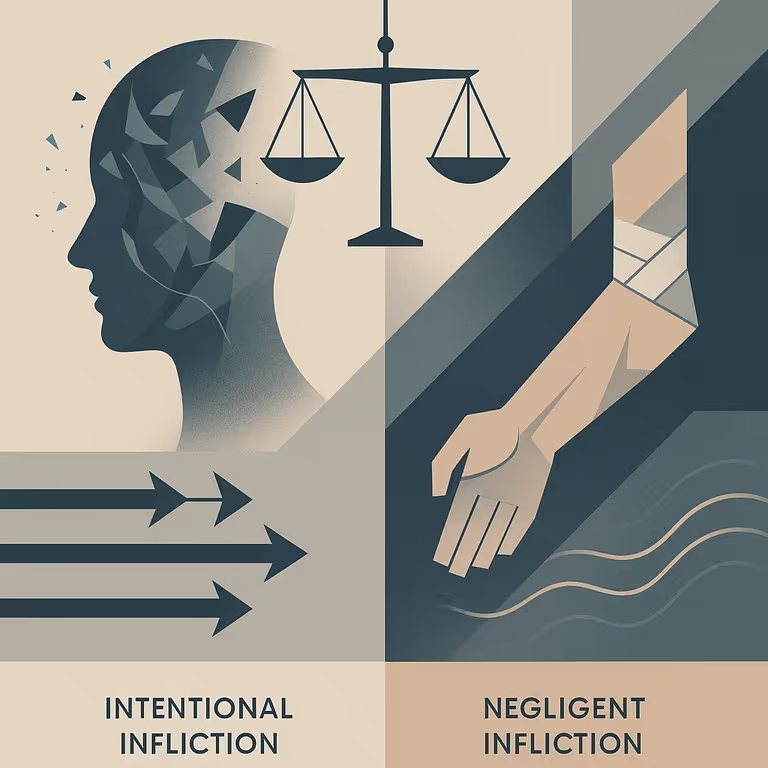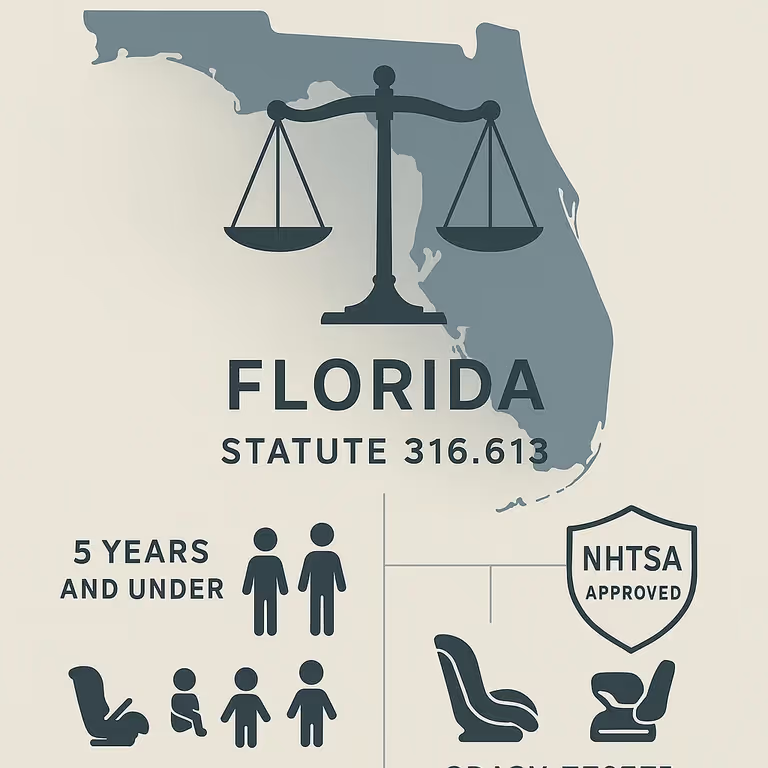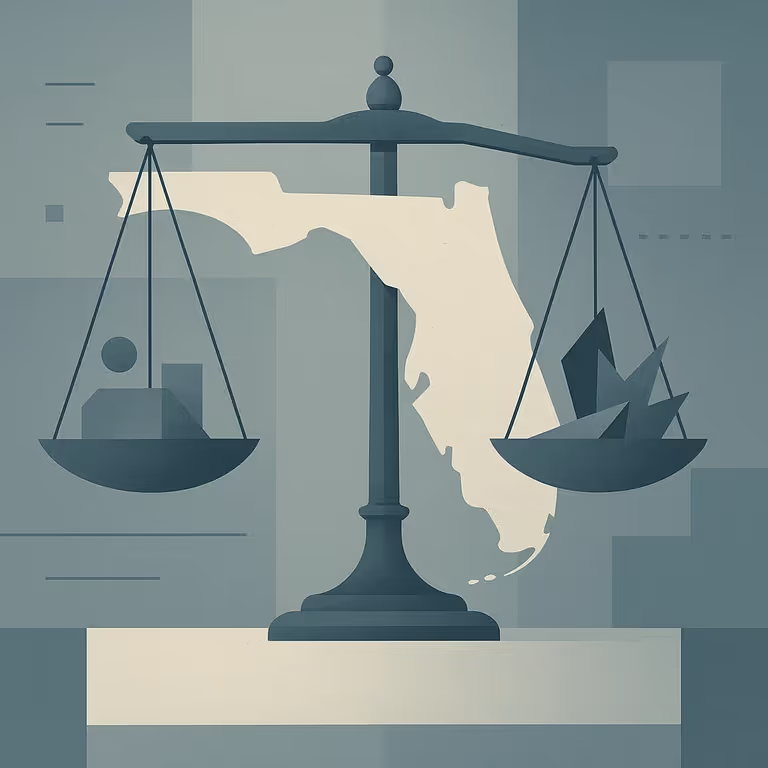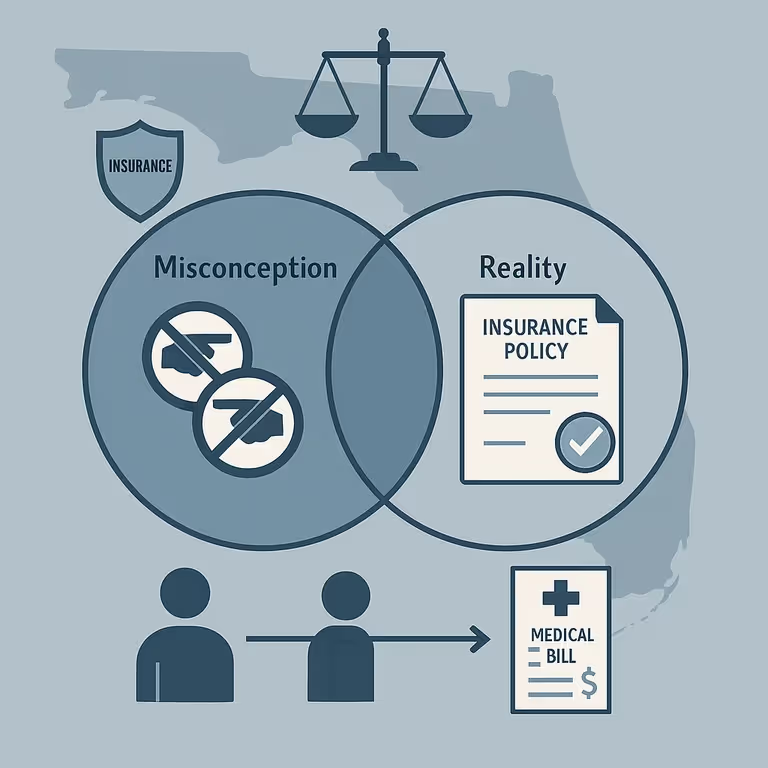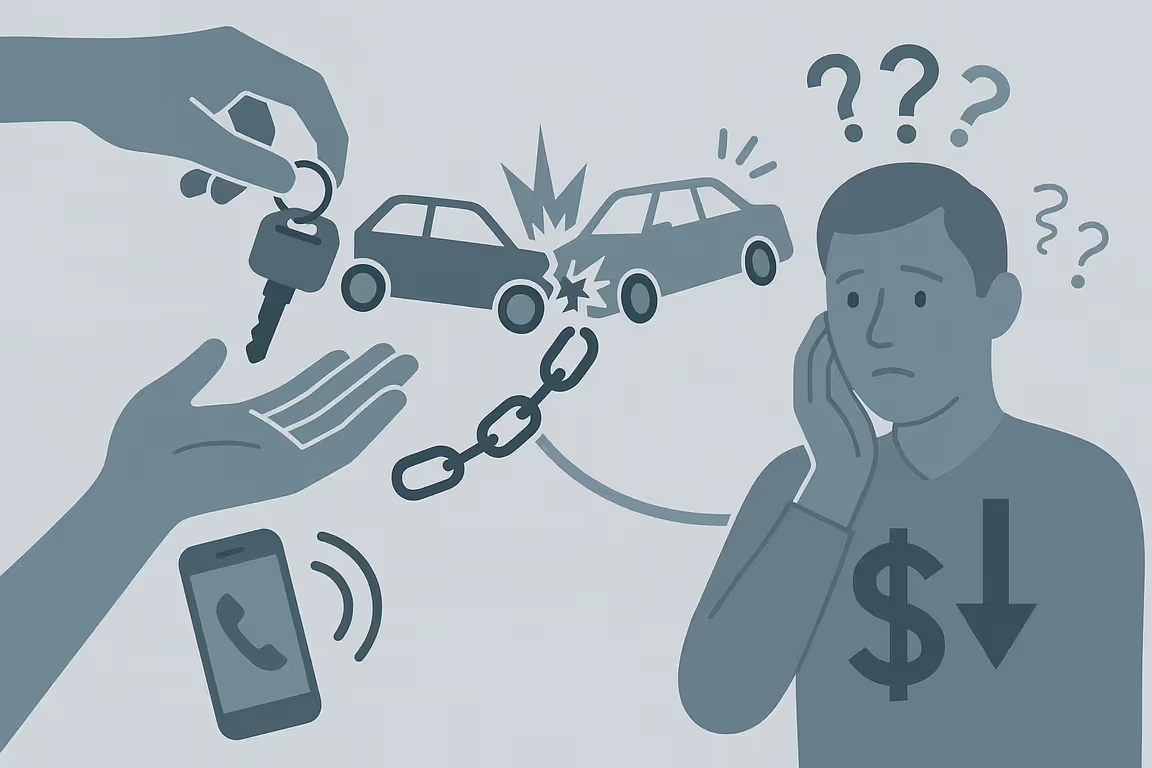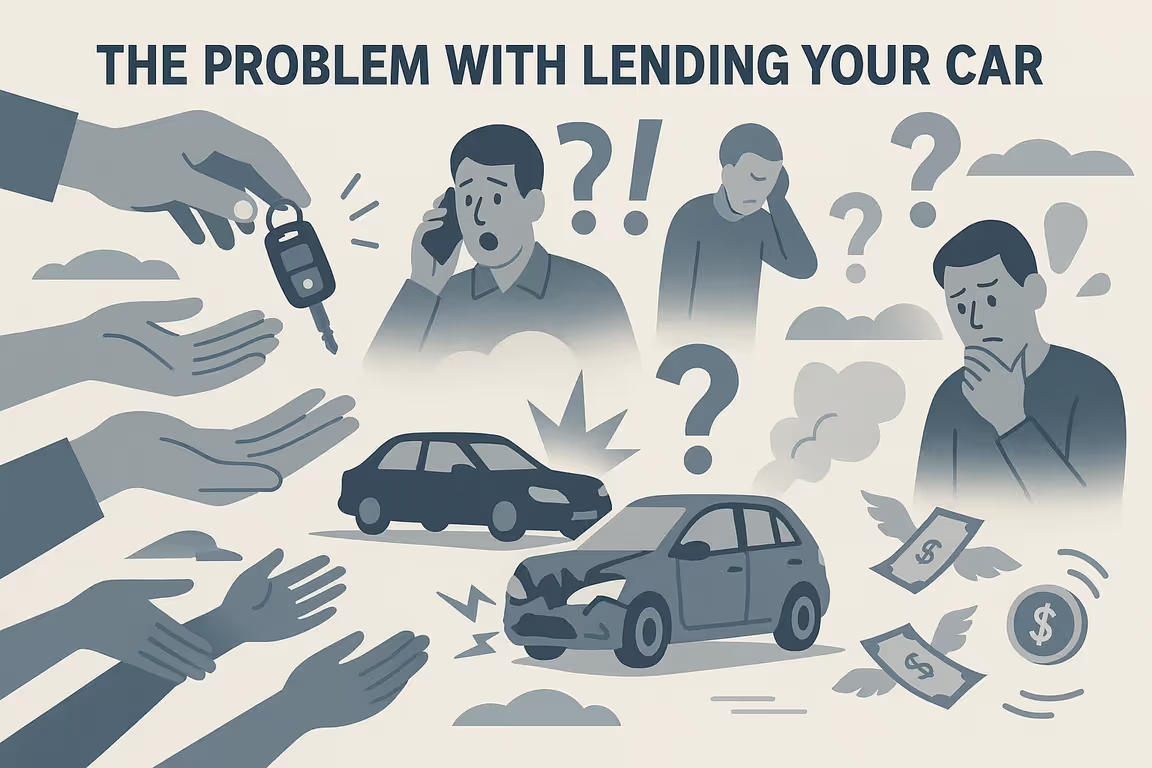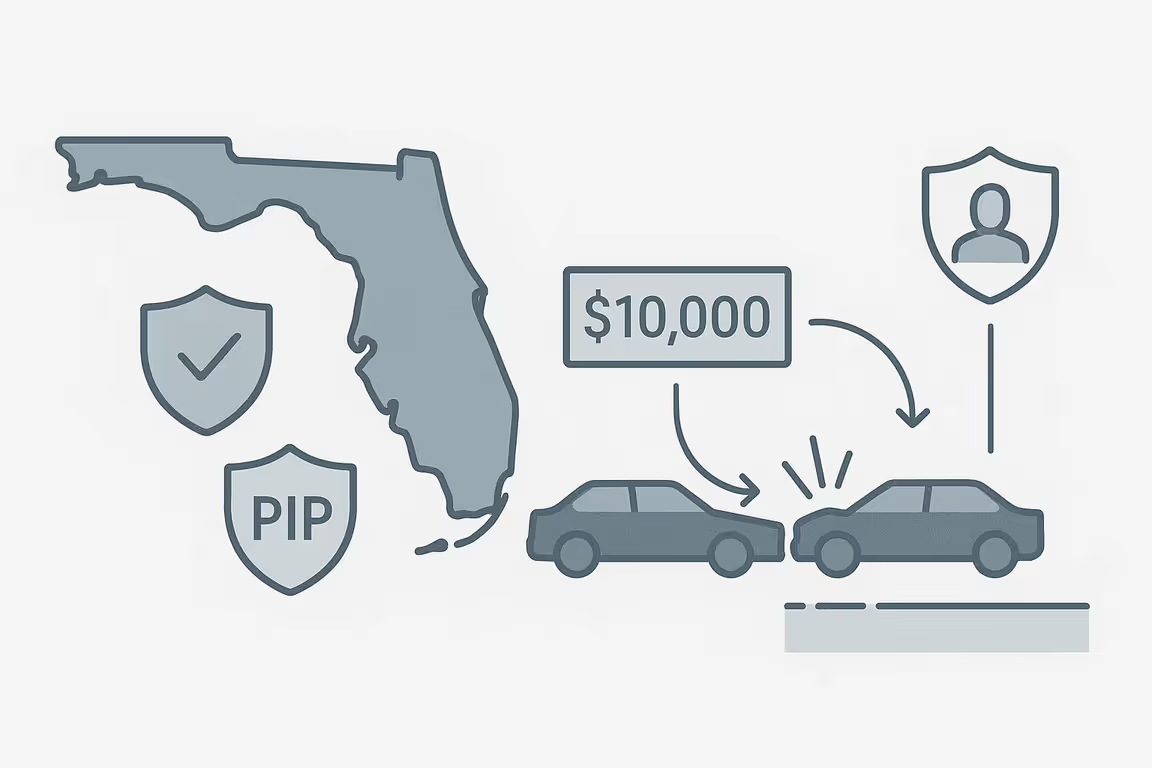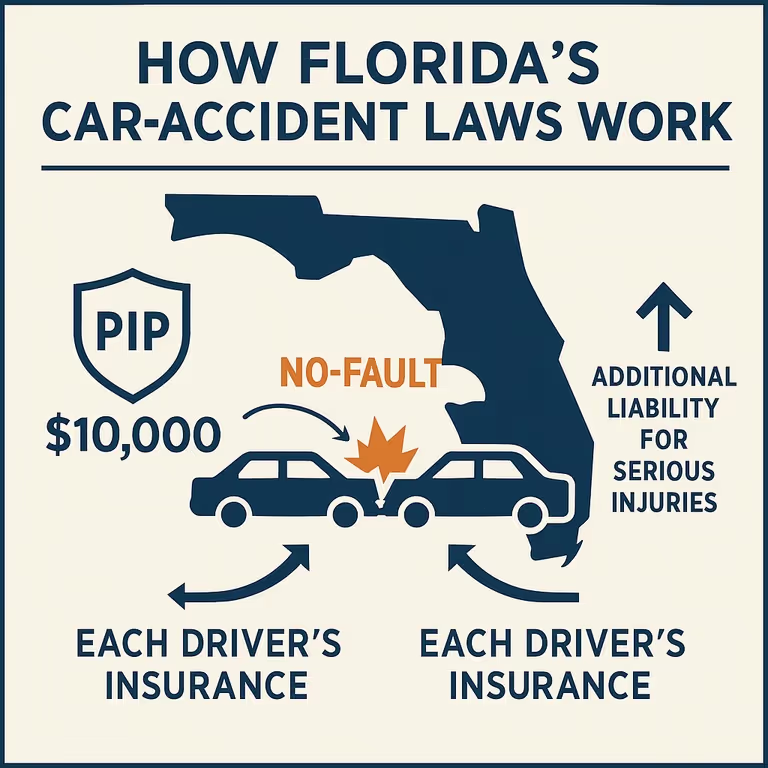Understanding Contingency Fee Arrangements in Florida Personal Injury Cases: How "No Recovery, No Fee" Works
Learn how Florida contingency fee arrangements work in personal injury cases, including limits, cost vs. fee differences, & why you only pay if you win.

- Contingency fee arrangements provide access to justice by allowing personal injury victims to secure quality legal representation without upfront costs, as attorneys only collect fees if they successfully recover compensation.
- Florida law establishes specific caps on contingency fees (33⅓% for pre-lawsuit settlements, 40% after filing a lawsuit, with lower percentages for recoveries exceeding $1 million) to protect clients while ensuring attorneys receive fair compensation.
- The distinction between "fees" (the attorney's percentage) and "costs" (case expenses like filing fees and expert witness fees) is crucial, as responsibility for costs if a case is unsuccessful depends on the specific terms in your written agreement.
Worried About Your Injury Case? We'll Review It - Free!


Imagine being injured in an accident in Melbourne, facing growing medical bills, and being unable to work—all while wondering how you could possibly afford an attorney to help you seek justice. This common scenario is precisely why contingency fee arrangements exist. A contingency fee arrangement is a payment structure where an attorney's fees are contingent upon securing a favorable outcome for the client—meaning you pay nothing upfront and nothing if your case doesn't succeed.
This fee structure serves a critical purpose in our justice system: ensuring that everyone, regardless of financial status, has access to quality legal representation. When you work with a Melbourne personal injury attorney, the financial barriers that might otherwise prevent you from seeking justice are removed, allowing your case to be evaluated on its merits rather than your ability to pay.
What Is a Contingency Fee Arrangement?
A contingency fee arrangement is a client-friendly payment model where the attorney only gets paid if they successfully recover compensation for you. Under this arrangement, instead of charging hourly rates or requiring a retainer, attorneys agree to accept a percentage of the recovery as their fee. Simply put: no recovery means no attorney fees.
This approach is the standard fee structure for personal injury lawyers in Brevard County and throughout Central Florida.
The fundamental principle behind contingency fees creates a natural alignment between you and your attorney. Since your attorney's payment depends on successfully recovering compensation, they are incentivized to pursue the maximum possible recovery on your behalf. This arrangement essentially means your attorney is investing in your case, betting their time and resources on a successful outcome.
According to Florida's Rules of Professional Conduct, attorneys who charge contingent fees must provide clients with a written fee agreement. This document must be signed by the client and clearly state the method by which the fee will be determined. This requirement ensures transparency and protects both the client and attorney by establishing clear expectations from the beginning.

Florida's Regulations on Contingency Fee Percentages
Florida doesn't leave contingency fee arrangements to chance or unchecked negotiation. The Florida Bar has established specific rules governing these arrangements to protect clients while ensuring attorneys receive fair compensation for their work. These regulations create a standardized framework for contingency fees in personal injury cases throughout Melbourne and Brevard County.
Standard Contingency Fee Percentages
The Florida Bar Rule 4-1.5 sets maximum percentages that attorneys may charge in contingency cases. These percentages vary based on both the stage of the case and the amount recovered:
- 33⅓% of any recovery up to $1 million if the case settles before filing a lawsuit
- 40% if the case settles after filing a lawsuit or goes to trial
- 30% of any recovery between $1 million and $2 million
- 20% of any recovery exceeding $2 million
This sliding scale approach reflects the reality that larger settlements don't necessarily require proportionally more work, while also recognizing that cases proceeding to litigation involve substantially more attorney time and resources. These percentages apply whether you've been injured in a car accident in Titusville, suffered a traumatic brain injury in Viera, or experienced a boating accident in Cocoa Beach.
When Higher Percentages May Apply
While Florida establishes these standard limits, there are circumstances where higher percentages may be appropriate. In exceptional cases with unusual complexity or risk, attorneys and clients may petition the court for approval of fees exceeding the standard caps.
This process requires a signed, notarized waiver from the client, demonstrating informed consent to the higher percentage. Courts carefully review these requests, considering factors such as:
- The complexity of the legal issues involved
- The skill and experience required to handle the case
- The time and labor necessary to properly represent the client
- The novelty of the questions presented
- The risk that the attorney will receive no compensation
This court review process provides an important safeguard, ensuring that higher fees truly reflect extraordinary circumstances rather than routine cases.
Different Fee Structures for Medical Malpractice Cases
Medical malpractice cases are subject to different percentage caps under Florida law, reflecting the unique challenges and expenses associated with these complex claims. The contingency fee limitations for medical malpractice cases are:
- 30% of the first $250,000 recovered
- 10% of any recovery over $250,000
These lower percentages aim to balance the need for patient access to representation with concerns about excessive litigation costs in the healthcare system. However, these limits may still be subject to court adjustment in exceptional circumstances, following the same petition process described above.

Understanding Costs vs. Fees in Contingency Arrangements
One of the most important distinctions to understand in any contingency fee arrangement is the difference between "fees" and "costs." These terms are not interchangeable, and the way they're handled can significantly impact your final recovery amount.
The Difference Between Attorney Fees and Case Costs
Attorney fees are the payment for the professional services rendered by your lawyer. This is the percentage of your recovery discussed in the previous section—the 33⅓% or 40% that compensates your attorney for their legal expertise, time, and effort in handling your case.
Case costs, on the other hand, are the actual expenses incurred during the litigation process. These are the out-of-pocket expenditures necessary to properly investigate, prepare, and pursue your claim. Unlike attorney fees, costs are not directly related to your lawyer's professional services but are instead the expenses required to build a strong case.
This distinction is crucial because while attorney fees are contingent on winning your case, responsibility for costs may be handled differently depending on your specific fee agreement.
Typical Costs in Personal Injury Cases
Personal injury cases commonly involve numerous expenses beyond attorney time. These costs can include:
- Court filing fees (required to initiate and maintain a lawsuit)
- Expert witness fees (for medical experts, accident reconstructionists, etc.)
- Deposition expenses (court reporter fees, transcript costs)
- Medical record acquisition costs
- Investigation expenses (private investigators, background checks)
- Exhibit preparation (demonstrative aids, models, charts)
- Mediation fees
- Postage, copying, and document production costs
- Travel expenses related to the case
These costs can range from a few hundred dollars in straightforward cases to tens of thousands in complex litigation involving multiple experts and extensive discovery, such as in commercial vehicle accidents or cases involving traumatic brain injuries in Brevard County.
How Costs Are Typically Handled
Most personal injury firms in Melbourne and throughout Brevard County, including Doug Beam and Riley Beam, advance costs on behalf of clients. This means the firm pays these expenses as they arise during your case, rather than requiring you to pay them out-of-pocket.
When your case resolves successfully, these advanced costs are typically reimbursed from the settlement or verdict amount before calculating the attorney's percentage fee. For example:
- Settlement Amount: $100,000
- Case Costs: $5,000
- Net Amount: $95,000
- Attorney Fee (33⅓% of net): $31,650
- Client Recovery: $63,350
This arrangement allows clients to pursue justice without worrying about funding the litigation process. However, it's important to understand that if your case is unsuccessful, your fee agreement will specify who is responsible for these costs. Some agreements may require clients to reimburse advanced costs regardless of outcome, while others may state that the firm absorbs these costs entirely if there is no recovery.
The Impact of Florida's 2023 Tort Reform (HB 837)
Florida's 2023 tort reform legislation (HB 837) brought significant changes to personal injury law that can indirectly affect contingency arrangements. While the law didn't directly modify contingency fee regulations, it implemented changes that may impact overall recovery potential in personal injury cases, including:
- Modifications to comparative negligence standards, potentially reducing recoveries in cases where plaintiffs bear partial responsibility
- Changes to bad faith insurance claim requirements, potentially affecting insurance policy limits recoveries
- Shortening of the statute of limitations for negligence claims from four years to two years
These changes highlight the importance of consulting with an experienced Central Florida personal injury attorney who stays current with evolving legal standards and can advise you on how recent legislative changes might affect your specific case.

Client Protections in Florida Contingency Agreements
Florida law provides numerous safeguards designed to protect clients who enter into contingency fee arrangements, ensuring transparency, fairness, and informed consent throughout the attorney-client relationship.
Required Elements in Written Agreements
Under Florida Bar Rule 4-1.5, contingency fee agreements must be in writing and signed by the client. These agreements cannot be verbal or informal arrangements. The written agreement must clearly state:
- The method by which the fee will be determined, including the percentage(s) that will accrue to the lawyer
- Whether the percentage varies based on case stage (pre-suit settlement, litigation, appeal)
- How expenses will be deducted from the recovery (before or after calculating the attorney's percentage)
- Whether the client will be responsible for costs if there is no recovery
- Any expenses for which the client will be liable regardless of outcome
- The lawyer's responsibility to provide a written statement at the conclusion of the case
This level of detail ensures clients fully understand the financial arrangements before proceeding, preventing misunderstandings or surprise fees later in the process.
Client's Right to Detailed Statements
When your case concludes, you are entitled to a written statement showing:
- The outcome of your case
- The total recovery amount
- A detailed breakdown of how funds will be disbursed
- The method used to determine your remittance
This statement provides complete transparency regarding how settlement funds are distributed, including itemized costs, attorney fees, medical liens, and your net recovery. This protection ensures you understand exactly where every dollar of your settlement goes, whether from a car accident settlement in Melbourne or a premises liability claim in Cocoa.
The 3-Day Cancellation Right
Florida law provides an additional layer of protection by giving clients a 3-business-day "cooling-off period" after signing a contingency fee agreement. During this time, you can cancel the agreement without penalty by simply notifying the attorney in writing.
This right prevents pressure tactics and allows clients time to reconsider their decision after the initial consultation. The cancellation right must be clearly explained in the contingency fee agreement, typically appearing prominently in the document.
The proper procedure for cancellation includes:
- Providing written notice of cancellation to the attorney
- Delivering this notice within three business days of signing
- Using certified mail or hand delivery to ensure proof of timely cancellation
Fee Dispute Resolution
Even with these protections in place, disagreements about fees can occasionally arise. Florida provides mechanisms for resolving these disputes:
- The Florida Bar's Fee Arbitration Program offers a voluntary process for resolving fee disagreements outside of court
- Clients can request a review of potentially excessive fees through the Florida Bar's Ethics Hotline
- Courts maintain ultimate authority to determine the reasonableness of fees and can adjust them if deemed excessive
These resolution mechanisms provide clients with accessible avenues to address concerns about contingency fees without necessarily requiring separate litigation. They apply to all personal injury cases throughout Brevard County, from car accidents in Indian Harbour Beach to bicycle accidents in Rockledge.

Benefits and Considerations of Contingency Arrangements
Contingency fee arrangements offer numerous advantages for personal injury clients in Melbourne and throughout Brevard County, though they also come with considerations that should be carefully weighed before entering into an agreement.
Advantages for Clients
The benefits of contingency fee arrangements include:
Access to justice regardless of financial status: Perhaps the most significant advantage is that contingency fees make high-quality legal representation available to everyone, regardless of their ability to pay upfront costs. This levels the playing field, particularly against well-funded insurance companies and corporations, whether you've been injured in a car accident in Central Florida or suffered a brain injury in Melbourne.
No upfront costs or ongoing bills: With traditional hourly billing, clients receive monthly invoices and must pay regardless of case outcome. Contingency arrangements eliminate this financial stress during what is often already a difficult time in your life.
Alignment of interests: Since the attorney only gets paid if you win, their financial interests directly align with yours. This creates a powerful incentive for your attorney to pursue the maximum possible recovery rather than billing additional hours.
Reduced financial risk: The financial risk of litigation shifts largely to the attorney. If your case is unsuccessful, you generally won't owe attorney fees, minimizing your financial exposure in an uncertain process.
Quality representation regardless of resources: Contingency arrangements allow you to retain experienced, successful attorneys whose hourly rates might otherwise be prohibitively expensive. This ensures you have skilled representation regardless of your personal finances.
Peace of mind during recovery: While focusing on your physical and emotional recovery from an injury, you can proceed with legal action without the added stress of managing legal costs.
Potential Considerations
While contingency arrangements offer significant benefits, they also come with considerations to keep in mind:
Percentage of recovery: Understanding that a substantial percentage of your recovery will go toward legal fees is important. This is the trade-off for removing upfront costs and shifting financial risk to the attorney.
Cost responsibility: Be sure you clearly understand who is responsible for case costs if your claim is unsuccessful. Different agreements handle this differently.
Case selectivity: Attorneys working on contingency must be selective about the cases they accept, as they're investing their time and resources. Cases with unclear liability or minimal damages may be difficult to place with contingency attorneys.
Value assessment: Attorneys may evaluate case value differently than clients. Having realistic expectations about potential recovery helps avoid disappointment.
Contingency Fees vs. Other Fee Structures
Understanding how contingency fees compare to alternative fee arrangements can help you appreciate the benefits of this model:
Hourly billing requires clients to pay for attorney time regardless of outcome, typically through an initial retainer followed by monthly bills. While this works well for predictable legal matters, it can become prohibitively expensive for lengthy personal injury litigation.
Flat fee services charge a set amount for specific legal tasks. While providing cost certainty, flat fees are rarely used in unpredictable personal injury cases that may require years of work.
Hybrid arrangements combine reduced hourly rates with smaller contingency percentages. These uncommon structures attempt to balance risk and reward between attorney and client.
For most personal injury clients in Brevard County, pure contingency arrangements offer the most accessible path to quality representation. They remove financial barriers to justice while ensuring your attorney is fully invested in your success.
Recent Legal Developments to Watch
Legislative attempts to modify Florida's legal landscape continue to emerge and evolve. For example, Senate Bill 148 (2025) was introduced in the Florida Legislature in January 2025, proposing new regulations for legal representation contracts involving the Department of Legal Affairs. This bill would established new requirements that could have affected contracts with attorneys. However, like many proposed bills, SB 148 failed to advance beyond its introduction in March 2025, joining other unsuccessful legislative efforts such as HB 1181 (which would have eliminated Florida's no-fault insurance system).
These legislative attempts—even when unsuccessful—signal the ongoing attention to legal fee arrangements and insurance frameworks in Florida's legislative sphere. While the current systems remain intact, personal injury clients and attorneys should monitor these developments, as they may impact future contingency agreements for cases from car accidents in Titusville to premises liability claims in Palm Bay.
Frequently Asked Questions (FAQs)
What happens if we lose the case? Do I still owe anything?
Under a true contingency arrangement, you won't owe attorney fees if there's no recovery. However, responsibility for case costs (filing fees, expert witness fees, etc.) depends on your specific agreement. Some agreements state that the client remains responsible for these costs regardless of outcome, while others specify that the firm will absorb these expenses if the case is unsuccessful. This critical detail should be clearly outlined in your written fee agreement.
Can the contingency fee percentage be negotiated?
Yes, while Florida sets maximum percentages, these are caps rather than mandatory rates. Clients and attorneys can agree to lower percentages, particularly in cases with clear liability and substantial damages. Factors that might influence negotiations include case complexity, estimated recovery amount, anticipated expenses, and the attorney's assessment of risk.
What happens if I fire my attorney in the middle of a contingency case?
If you terminate your attorney before case resolution, they typically retain a right to compensation for work already performed under a legal principle called "quantum meruit" (meaning "what is deserved"). This is usually calculated based on their normal hourly rate for time spent on your case, or as a portion of the contingency fee if another attorney later resolves your case successfully. Your fee agreement should address this possibility.
Are there any cases that can't be handled on contingency?
Yes, ethical rules prohibit contingency arrangements in criminal defense cases and most family law matters (like divorce). Additionally, some civil cases may be unsuitable for contingency arrangements due to limited damage potential, unclear liability, or excessive risk. Experienced attorneys evaluate each case individually to determine whether a contingency arrangement is appropriate, whether it's a car accident in Brevard County or a premises liability case in Cocoa Beach.
How long does a typical personal injury case take to resolve?
While every case is unique, personal injury cases typically take between several months and several years to resolve. Simple cases with clear liability may settle in 6-12 months, while complex cases involving catastrophic injuries or disputed liability may take 2-3 years or longer, especially if they proceed to trial and potential appeals. Your attorney should provide you with a realistic timeline based on your specific circumstances.
Can I recover attorney's fees from the other party in a personal injury case?
Unlike some legal matters where fee-shifting is common, personal injury claims generally follow the "American Rule," meaning each party pays their own attorney regardless of outcome. However, exceptions exist, particularly in cases involving insurance bad faith, certain contract provisions, or specific statutory claims. Your attorney can advise if fee recovery from the opposing party might be possible in your situation.
Do I need to pay taxes on my personal injury settlement?
Generally, compensation for physical injuries or illness is not taxable under federal law. However, portions of your settlement allocated to punitive damages, interest, or lost wages may be taxable. Additionally, if you previously deducted medical expenses related to your injury, you may need to report a portion of your recovery as income. We recommend consulting with a tax professional regarding the specific tax implications of your settlement.
What should I look for in a contingency fee agreement?
Key elements to examine include:
- Clear statement of fee percentages and how they may change at different stages
- Detailed explanation of how costs will be handled and who bears responsibility if the case is unsuccessful
- Transparent outline of the types of expenses you might incur
- Clear description of when and how the attorney-client relationship can be terminated
- Explanation of your 3-day right to cancel
- Plain language that you can fully understand
Conclusion
Contingency fee arrangements serve a vital role in ensuring access to justice for personal injury victims throughout Melbourne, Brevard County, and all of Central Florida, regardless of financial status. By removing upfront costs and aligning attorney compensation with successful outcomes, these arrangements level the playing field against well-funded insurance companies and corporate defendants.
The key to a successful contingency relationship is transparency and understanding. By clearly differentiating between attorney fees and case costs, knowing your rights under Florida law, and carefully reviewing your written agreement, you can confidently pursue your claim without financial stress.
If you've been injured in Melbourne, Palm Bay, Titusville, or anywhere in Brevard County, and are concerned about affording legal representation, contact our experienced personal injury attorneys today at (321) 723-6591 for a free consultation to discuss your case and learn more about our contingency fee arrangements. Remember, you pay nothing unless we win.
Sources
- Florida Bar Consumer Pamphlet
- Florida Bar Rule 4-1.5
- Florida HB 837 (2023) Analysis
- Florida SB 148 (2025) Bill Text
- IRS Publication 4345
Not Sure What To Do Next? We Can Help – Fast & Free.
Worried About Your Injury Case?
We'll Review It - Free
Don’t miss an article
Florida law, local insights, and the occasional dog pic.
Delivered straight to your inbox.
More articles
Browse all articlesFree Case Review
Get a complimentary review of your case

.webp)
